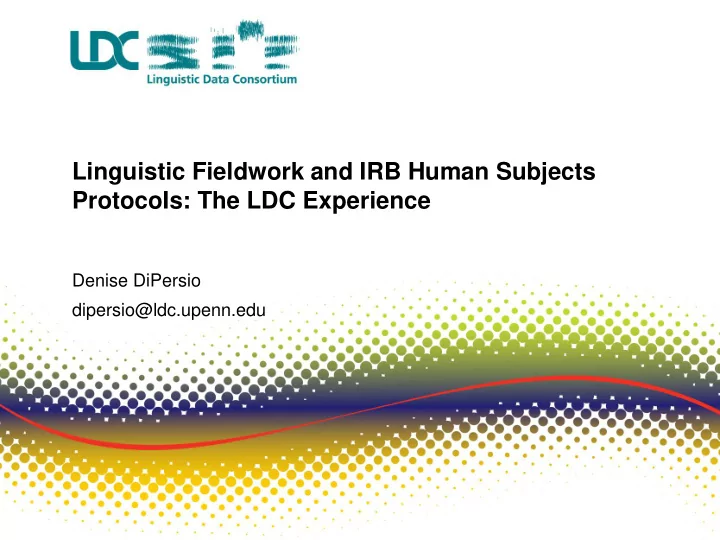

Linguistic Fieldwork and IRB Human Subjects ProtocoIs: The LDC Experience Denise DiPersio dipersio@ldc.upenn.edu
IRB History and Practice General principles for human subjects research Respect for persons: autonomy, consent, truthfulness Beneficence: do no harm, maximum research goals Justice: fair, non-exploitative procedures Common Rule concerns Will the study require the participation of vulnerable populations? How will informed consent be obtained? How will confidentiality be maintained? Social sciences research IRB reviews geared for medical research Lack of uniformity Miscommunications Sociolinguistic Archival Preparation, LSA Satellite Workshop, Portland, OR 4-5 Jan 2 2012
LDC’s Protocol In place for almost 20 years with University of Pennsylvania’s IRB Covers speech, text, handwriting, language-related judgments On-site at LDC, in the field, crowdsourcing Data collected distributed as corpora to support language research, education and technology development Umbrella protocol modified as needed to add new studies, approve new/revised consent forms, modify existing studies Largely successful Challenges: new collection methods/technology, timing, increased interest/attention to social science research methods Sociolinguistic Archival Preparation, LSA Satellite Workshop, Portland, OR 4-5 Jan 3 2012
Protocol Features Record linguistic performance Speech, writing, typing, dictation In person, via phone, computer-mediated device, writing surface, no human/machine interlocutor Optionally with headset transmitting silence/noise Collect judgments about linguistic behavior and decisions involving linguistic data Auditing speech recordings Judging handwriting legibility Summarizing written text, reading comprehension Collect linguistic performance Gaze tracking, strokes/minute Sociolinguistic Archival Preparation, LSA Satellite Workshop, Portland, OR 4-5 Jan 4 2012
Fieldwork Methods and Procedures, 1/2 Non-remote field locations (Philadelphia, Seoul) Speech recorded to digital recorders/computers; copied to LDC database as soon as practicable Remote field locations (Papua New Guinea) Bilingual native speakers record participant speech to digital recorders Uploaded to laptop; backed up on mass storage device; uploaded to LDC following each field trip Personal identifying information Logbooks spreadsheet mass storage device LDC Data Secure storage; encrypted spreadsheet; fieldworker control LDC: secured network, locked file cabinets Sociolinguistic Archival Preparation, LSA Satellite Workshop, Portland, OR 4-5 Jan 5 2012
Fieldwork Methods and Procedures, 2/2 Consent Written consent; informed consent form Verbal consent, recorded (unwritten languages, speakers not literate in native language(s)) Consent through action (pushing button for telephone study; performing crowdsourcing task) Accommodations for IRB Examples of questions that will be asked “Script” for verbal consent Sociolinguistic Archival Preparation, LSA Satellite Workshop, Portland, OR 4-5 Jan 2012 6
Conclusions If “the way to do fieldwork is never to come up for air until it is all over” (Margaret Mead), getting the protocol is simple by comparison. Preparation – be able to articulate your plan Relationships – department, IRB Fieldwork is consistent with federal guidelines Crib from/use available resources Be sensitive to IRB independence Sociolinguistic Archival Preparation, LSA Satellite Workshop, Portland, OR 4-5 Jan 2012 7
Recommend
More recommend